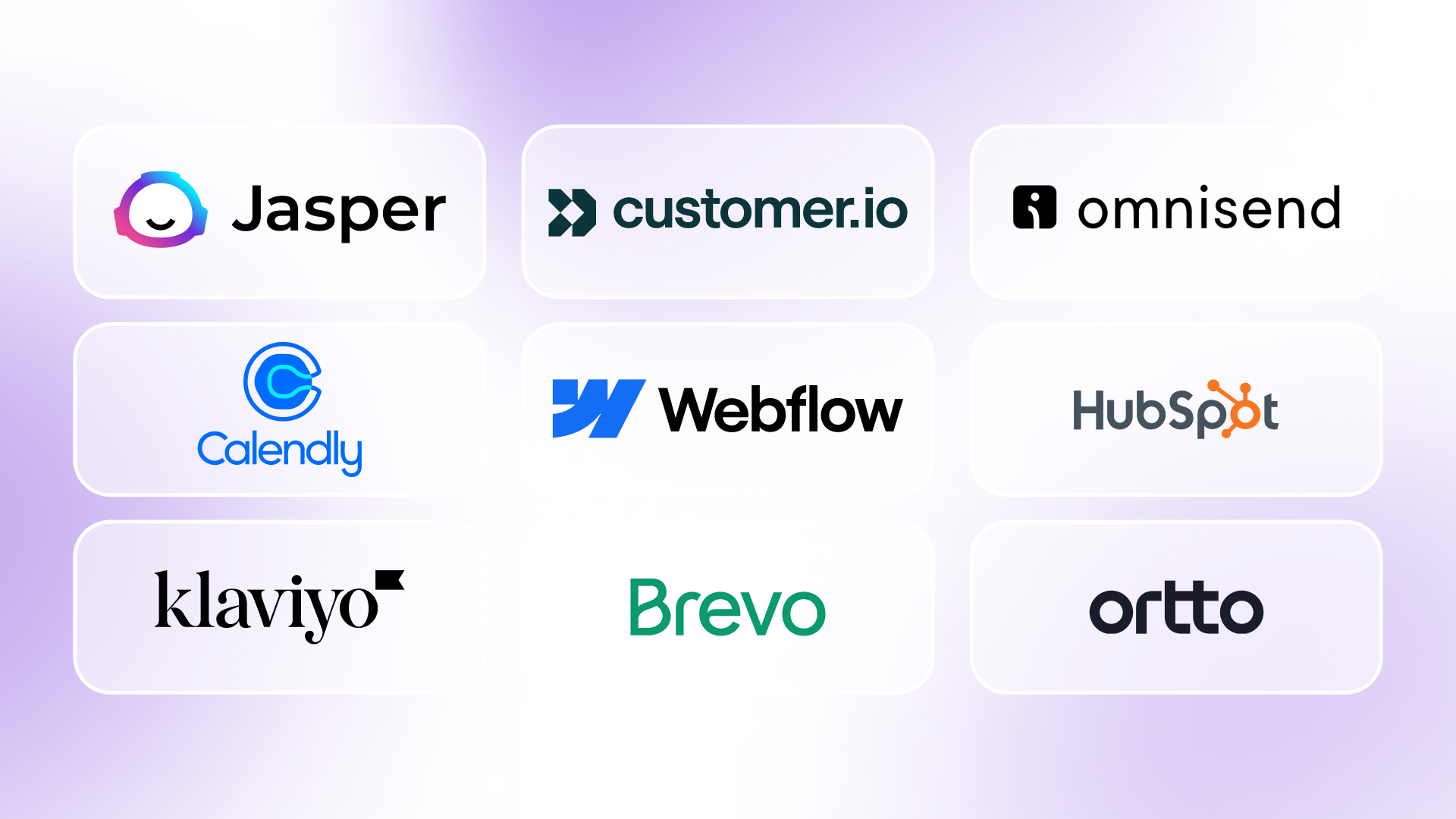Jasper Marketing
November 7, 2024
The Top 10 Marketing Tools to Build Your Tech Stack in 2025
Discover the top 10 marketing tools to build your tech stack in 2025—from content marketing and SEO to automation, social media management, and analytics tools.

Success in marketing—or almost any line of business in a digital-first world—depends upon technology. Only with the right tools in its tool stack can a marketer succeed.
The reason? Customer expectations have evolved. More than simple and fast customer experiences are required. Customers expect every touchpoint to be personalized and proactive. These demands breed the need for more sophisticated marketing tools empowered by new capabilities like large language models, machine learning, deep learning, and natural language processing.
Now, marketing leaders are asking what tools can help them scale and futureproof their businesses.
In this article, we look at the marketing trends that will dominate the upcoming year, uncover the factors you need to consider when choosing the right marketing tool, and discuss ten marketing tools that can fuel your business growth in 2025. Let’s dive in.
Marketing Trends That Will Dominate in 2025
The crux of the challenge (and the opportunity!) in marketing is staying ahead of customer expectations in a competitive and tech-driven marketing landscape, often pressed by fewer resources and budget cuts. Where does the opportunity lie?
While marketers face many challenges, it’s also true that it’s never been more exciting to work in marketing. Technology develops at breakneck speed, keeping marketers on their toes and always looking for the next tool to help them achieve their marketing goals.
That said, let’s look at the trends that will continue transforming marketing in the future.
- AI-fueled marketing: Advancements in AI technologies have completely changed the business landscape. Leading businesses are already experimenting with or fully implementing AI tools to tackle different challenges, from scaling creativity to automating processes. According to Boston Consulting Group, three out of five CMOs plan to invest at least $10 million annually in AI and GenAI initiatives over the next three years.
- Data-backed personalization vs. data privacy: The second half of the 2020s will be all about personalized customer experiences. According to Deloitte, nearly 3 in 4 consumers are more likely to purchase from brands that deliver personalized experiences—and spend 37% more with those brands. But here’s the thing: there’s a fine line between personalization and intrusion. Data from Norton shows that 8 in 10 consumers are concerned about data privacy. That said, it’s up to marketers to find the right balance between personalization and data privacy.
- Zero-click content: If you’re a marketer, chances are you’ve heard about zero-click content. In a nutshell, this approach prioritizes content that offers valuable insights without the need to click (think a LinkedIn post that doesn’t include a link). Why is this important? Because it reinforces the need for content repurposing across different touchpoints tailored to the specific platforms where you post content.
- The new role of SEO content: In the past, SEO content's role was to pass Google’s numerous algorithm yardsticks. Things have changed. The rise of AI search engines, such as Perplexity, has once again fueled discussions about the evolving role of SEO. While things are constantly evolving, it’s safe to say that SEO will focus on optimizing for AI-driven search algorithms, personalized user experiences, voice, and visual search, as well as maintaining high-quality, relevant content to meet evolving user intent.
- Content remains a top priority: We live in the age of content abundance. Businesses create content at an unprecedented rate, and this will likely continue for years to come. Content will remain king in 2025 because it drives personalized customer engagement, fuels AI-powered insights, and remains the foundation for building trust, authority, and lasting relationships in an increasingly competitive digital landscape.
Choosing the Right Marketing Tool for Your Business
Building your marketing tech stack can feel daunting. There are many tools today, and you can easily find yourself stuck in the paradox of choice. The good news is that there are some rules you can follow to help you decide on the right marketing tools for your business.
- Features: First things first—you need a feature-rich tool that will help you tackle multiple tasks. When choosing between similar solutions, list the features they offer and how they can help you achieve your goals.
- Scalability: If you’re in it to win it, you have to think about ways to scale your business in the future. Marketing tools that scale with your business are an integral part of the growth process. Always choose your tools with future needs in mind.
- User experience: Marketing tools are part of your daily tasks. Imagine being stuck with an unintuitive, clunky, and hard-to-navigate tool. Sounds terrible, right? To avoid this scenario, prioritize marketing tools that offer a delightful user experience. Most tools offer trials and demos that give you a sense of what working with the tool looks like. So, when in doubt, take them for a test drive.
- Ease of integration: The tools you choose should fit seamlessly in your tech stack. If you want to create seamless workflow automation, reduce technical complexity, and remove data silos, make sure you choose marketing tools that are easy to integrate.
- Budget: Marketers have been facing budget cuts, forcing them to scramble with tools that don’t fit their needs. When choosing marketing tools, budget is not just about the initial price but also about evaluating the tool’s features and ability to save time, enhance productivity, and improve efficiency. This ultimately contributes to a higher overall ROI through streamlined operations and better results.
10 Marketing Tools to Fuel Your Business Growth in 2025
Now that we’ve uncovered the trends that will shape the marketing landscape and analyzed the factors you need to take into consideration when choosing marketing tools, it’s time to look at our top picks for marketing tools you need to try in 2025:
Content Marketing Tools
If content marketing is the lifeblood of your business, you need content marketing tools that can boost your productivity and help you scale content production.
Jasper

Jasper is a purpose-built generative AI platform for marketing that empowers teams and helps them scale content production with AI-enhanced content that meets the marketing quality bar.
Unlike other AI tools, with Jasper, you get access to an AI document editor trained exclusively in marketing best practices. So, instead of worrying about the prompts that will give you the right results, with Jasper, SEO best practices are already baked into the output.
Jasper Brand Voice combines the power of AI with your brand’s unique tone and style to build consistency across all AI-generated content and create content that’s always on-brand. You can teach Jasper about your style guide, product catalogs, company facts, and brand identity to ensure you create authentic content.
When it comes to brand identity, tone of voice is just one side of the coin—visual identity is the other. If this is something you’ve struggled with in the past, Jasper’s AI Image Suite can help you create original art and visual assets within seconds.
Grammarly

Grammarly is a cloud-based typing assistant that helps you craft mistake-free, clear writing with suggestions for correct spelling, grammar, syntax, and more. Besides providing suggestions to enhance your vocabulary and sentence structure, Grammarly offers a plagiarism tool that scans content to ensure it’s original.
There’s nothing more frustrating than sending an email with a typo (that you just happened to sport after you clicked send). Using this tool, you can catch typos, missing punctuation, grammatical errors, and commonly confused words before you hit send.
With Grammarly, you can rephrase sentences with AI-powered suggestions to help you write clearly and concisely to convey the right message every time. Grammarly works across 500,000+ apps and websites so that you can boost productivity without breaking focus with copy-pasting content across platforms.
SEO Tools
There’s no doubt that the role of SEO is evolving. However, SEO will be crucial for marketing in 2025 as it drives organic traffic, enhances online visibility, and ensures your business stays competitive in today’s digital-first landscape.
Ahrefs

Ahrefs is an SEO platform with tools for keyword research, competitor analysis, link building, and site audits.
With the Keywords Explorer, you can learn what your customers are searching for and generate thousands of keyword ideas that you can rank based on reliable metrics, such as estimated ranking difficulty, search volumes, traffic potential, and SERPs.
Using the Site Auidt feature, you can run a complete SEO audit of your website to identify, prioritize, and fix technical and on-page SEO issues. Once you finish the audit, Ahrefs provides recommendations on how to fix the issues, visualizes key data in a chart, and delivers an overall SEO health score.
If you want to check how you stack up against your competitors, you can see what keywords your competitors rank for in search and how much traffic each keyword brings them. This way, you can perform a gap analysis and understand the areas where you need to improve your performance.
SEMrush

SEMrush is an all-in-one digital marketing tool that helps businesses improve their online visibility and performance through SEO, PPC, content marketing, and competitive research.
With SEMrush, you can uncover keywords and analyze them based on volume and difficulty, run technical SEO audits, check any domain’s backlink profile, and track your SERP positions daily.
Using Topic Research, you can find the topics that resonate with your audience, get actionable tips to create SEO-friendly content and optimize your content for engagement and organic traffic.
SEMrush also serves as a competitive intelligence platform where you can analyze any website’s traffic, understand competitor promotion strategies, get ideas for growing your market share, and discover keyword and backlink gaps.
Marketing Automation Tools
Marketing automation tools serve to create customer segmentation, streamline campaigns, personalize customer experiences, and optimize repetitive tasks to help marketers drive efficiency and scale their marketing efforts.
HubSpot

HubSpot is a comprehensive inbound marketing, sales, and customer service platform with features for predictive lead scoring, automated email marketing, and customer segmentation.
Its core features include a robust CRM system that allows businesses to track and manage interactions with leads and customers in one centralized location. The platform also provides tools for email marketing, social media management, content creation, and lead generation, helping businesses attract and nurture prospects.
HubSpot's marketing automation tools allow for personalized workflows, lead scoring, and detailed analytics to measure the success of campaigns.
HubSpot also provides various AI-powered tools seamlessly integrated into the customer platform. From Breeze Copilot, a personal assistant that helps with different tasks, and Breeze Agents, AI-powered experts designed to automate workflows, to Breeze Intelligence, a data enrichment tool, HubSpot has the tool you need to enhance your business operations.
Klaviyo

Klaviyo is an email marketing and automation platform that helps businesses deliver personalized, data-driven communications to their customers and automate workflow across marketing channels.
Using Klaviyo, businesses can engage with customers across multiple communication channels, including email, SMS, mobile push notifications, and product reviews. The platform’s ability to seamlessly connect with customers through these various touchpoints allows for more consistent and personalized interactions, helping businesses build stronger relationships with their audience.
One of Klaviyo’s standout features is its advanced segmentation capabilities, allowing you to create highly targeted campaigns tailored to your customers’ needs and behaviors. By leveraging customer data, Klaviyo ensures that each email, SMS, or push notification is sent to the right audience at the optimal moment.
With the customer data platform, you can get valuable insights about your customers that will help you promote the right products at the right time through purchase pattern insights for each product in your catalog. Moreover, Klaviyo can help you better forecast customer lifetime value with custom CLV predictions.
Social Media Management Tools
Social media is evolving fast, and so is the way we engage with it. It’s no longer a one-way street for companies to shout into the void. Now, it’s about genuine conversation, responsive customer support, and creating experiences that people actually care about. And social media management tools can help you achieve that mission.
Hootsuite

Hootsuite is an all-in-one social media management tool that helps businesses with scheduling, content creation, analytics, and social listening.
With Hootsuite, you can easily create, schedule, and publish content for all your platforms from a single dashboard. Moreover, using the platform, you can see heat maps showing when to post to reach your goals. Then, automatically schedule your content to go live at that time. You can also cut hours from your workweek by using the bulk social media scheduler to schedule up to 350 posts at once.
The platform helps you track some of the most popular social media metrics, such as reach, engagement rate, impressions, likes, plays, shares, clicks, saves, comments, video views, new followers, total followers, profile visits, reactions, website clicks, and daily engaged users.
Using Hootsuite Advanced Analytics, you can get a holistic view of your performance on social media. It even helps you track how many people visit your website from social media with integrations for Google Analytics and Adobe Analytics.
Sprout Social

Sprout Social is a comprehensive social media management platform designed to help businesses effectively manage and grow their online presence, with features for scheduling, analyzing, and engaging with content across multiple social channels, all from one dashboard.
With a unified inbox, you can automate tasks to accelerate response times so you can spend more time connecting with customers on a human level. Sprout Social allows you to resolve customer questions faster with AI-enhanced agent replies and control a smarter inbox with automated routing and chatbots.
Moreover, it has advanced social listening features that help you uncover key learnings from millions of unfiltered thoughts, feelings, and opinions to enhance your current strategy and guide future action. You can automatically sift through billions of data points to spot trends, generate AI summaries of long-form messages, and surface notable conversation trends in your key topics with AI-powered sentence insights.
Analytics and Reporting Tools
Today, there is no shortage of data sources. Customers nowadays leave digital breadcrumbs everywhere. The problem is how to unify all that data and put it to work. Analytics and reporting tools can empower marketers to reach customers in new ways and boost efficiency.
Google Analytics 4

Google Analytics 4 is the next generation of Analytics that collects event-based data from websites and apps.
Unlike its predecessors, GA4 shifts to an event-based data model rather than a session-based one, allowing for more granular insights into user actions and behaviors. This event-driven approach provides greater flexibility in tracking specific interactions and customizing reports based on your unique business needs, moving beyond just pageviews or sessions to focus on key user activities.
The platform’s predictive features offer actionable insights, helping you predict future trends and customer behavior. Google Analytics enables you to understand how your customers interact across your sites and apps throughout their entire lifecycle and anticipate future customer actions with Google’s machine learning.
Tableau

Tableau is a visual analytics platform, that empowers people and organizations to make the most of their data. Its key features include the ability to connect to a wide variety of data sources, from spreadsheets to cloud services, and automatically update visualizations as the data changes.
What sets Tableau apart is its intuitive user experience. Tableau disrupted business intelligence with intuitive analytics and built-in visual best practices. Tableau offers drag-and-drop functionality, making it accessible for both beginners and advanced users to create complex visualizations without needing to write code.
With advanced analytics tools like trend lines, forecasts, and clustering, Tableau helps you uncover hidden patterns and make data-driven decisions. Its flexibility and scalability make it a go-to choice for businesses looking to gain deeper insights and streamline their data analysis processes.
Supercharge your 2025 Marketing Efforts with Jasper
We are in the midst of a marketing renaissance. Businesses around the globe are ramping up investments in marketing tools to improve efficiency and create the best customer experience possible. If you’re looking for ways to scale your content production and transform existing processes with AI-powered workflows, check out Jasper—the AI platform built exclusively for marketing teams.
More of the latest & greatest

Gemini 3 Pro in 24 Hours: Inside Jasper’s LLM-Optimized Architecture
How does Jasper validate new AI models like Gemini 3 Pro in under 24 hours? Inside our rigorous 3-step testing process for enterprise marketing.
December 4, 2025
|
Nick Hough

3 Predictions for AI in Marketing in 2026
In 2026, AI will rewire teams, streamline tooling, and turn content into a competitive engine.
December 2, 2025
|
Loreal Lynch
.png)
Highlights from Jasper Assembly: Scaling Content with Confidence
Discover key insights from Jasper Assembly 2025. Leaders from Sanofi, NetApp, U.S. Bank, and BCG shared AI marketing strategies for scaling content and driving impact.
November 19, 2025
|
Loreal Lynch













